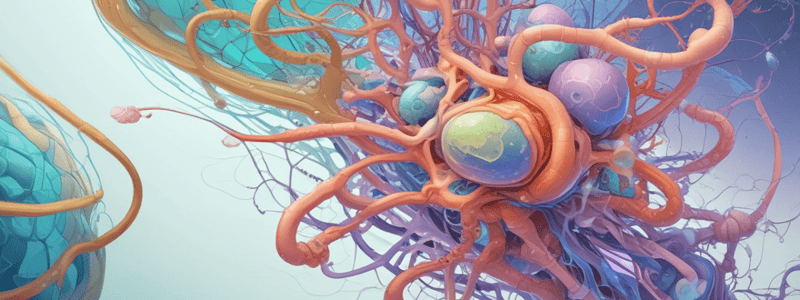Podcast
Questions and Answers
What is biology focused on?
What is biology focused on?
- The structure of cells
- The ecosystem as a whole
- Life (correct)
- The process of metabolism
What is the basic unit of organization for all life forms?
What is the basic unit of organization for all life forms?
- Molecules
- Tissues
- Organs
- Cells (correct)
Why do viruses not fully meet the definition of 'life'?
Why do viruses not fully meet the definition of 'life'?
- They are too small
- They cannot grow
- They are not made of cells
- They depend on cells for their reproduction (correct)
What is a key feature of biology and all other sciences?
What is a key feature of biology and all other sciences?
What is a characteristic of life?
What is a characteristic of life?
What do scientists form based on existing knowledge and observations?
What do scientists form based on existing knowledge and observations?
What is a nonscientific claim?
What is a nonscientific claim?
What emerges from interactions among cells?
What emerges from interactions among cells?
Flashcards are hidden until you start studying
Study Notes
Biology and Its Place in Science
- Biology is a science focused on life and its various aspects.
- The course covers the foundations of biology, including chemistry, cells, and metabolism.
Definition of Life
- The definition of life centers on the cell, which is the basic unit of organization for all life forms.
- Characteristics of life include:
- Growing using raw materials and energy
- Reproducing with the help of DNA as genetic material
- Sensing and responding to changes in the external environment
Exclusion of Viruses from the Definition of Life
- Viruses do not fully meet the definition of "life" because they depend on cells for their reproduction.
Organization of Life
- Atoms and molecules organized in a particular way generate a living (biotic) cell capable of growth and reproduction.
- Properties of tissues and organs emerge from interactions among cells.
- Tissues and organs combine to form an organism, and multiple organisms give rise to populations, communities, and complex ecosystems.
Scientific Inquiry in Biology
- Biology, like all sciences, develops through the application of scientific inquiry.
- Scientific inquiry involves:
- Asking questions
- Forming hypotheses based on existing knowledge and observations
- Testing hypotheses through experiments or observations
- Analyzing data to determine whether the hypothesis is supported
- A nonscientific claim is a hypothesis that cannot be effectively tested by verifiable observations or experiments.
Studying That Suits You
Use AI to generate personalized quizzes and flashcards to suit your learning preferences.




